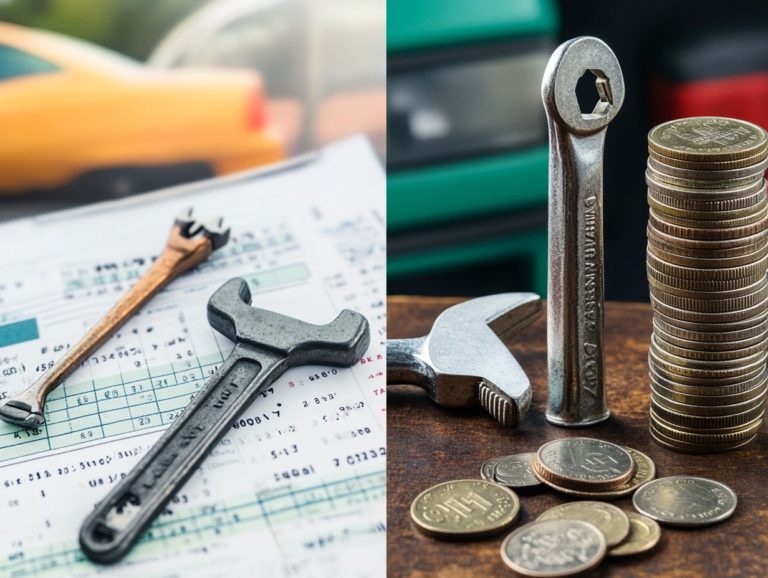How to Evaluate New Car Resale Value
When it comes to selling your car, understanding its resale value is essential for maximizing your return. Several factors come into play, such as depreciation rates, brand reputation, and the vehicle’s overall condition.
Whether you re contemplating upgrades or seeking tips to maintain its value, knowing how to deal with these factors can truly make a difference.
This guide will explore the key factors influencing resale value, effective research strategies, and practical tips to secure the best deal when it s time to sell!
Contents
- Key Takeaways:
- Factors Affecting Car Resale Value
- Researching Resale Value
- Tips for Maintaining Resale Value
- Selling Your Car for the Best Resale Value
- Frequently Asked Questions
- What factors should I consider when evaluating a new car’s resale value?
- Is it important to research the current market trends when evaluating a new car’s resale value?
- Can I use online tools to help me evaluate a new car’s resale value?
- How does the make and model of a car affect its resale value?
- What can I do to maintain a high resale value for my new car?
- Are there any other factors besides the car itself that can affect its resale value?
Key Takeaways:

- Regular maintenance and repairs can help maintain a car’s resale value.
- Researching online tools and expert opinions can assist in evaluating a car’s resale value.
- Timing, location, and negotiation skills can impact the resale value when selling a car.
Factors Affecting Car Resale Value
When you think about the resale value of your car, several key factors can significantly influence its worth. These include depreciation rates, brand reputation, and the overall condition of the vehicle.
Understanding these elements is essential for anyone aiming to secure the best pricing or trade-in value. Utilizing tools and resources such as Kelley Blue Book, Edmunds, and J.D. Power provides invaluable estimates and recommendations to help determine your vehicle’s private-party value, while considering varying market conditions and demands.
Depreciation Rates
Depreciation rates are a crucial factor affecting your car’s resale value. Vehicles tend to lose value over time due to influences such as mileage and overall condition. Depreciation is the decrease in a vehicle s value over time.
You ll notice that different car models and brands experience varying depreciation rates, significantly impacting their long-term value. Luxury vehicles often depreciate faster than economy cars; some studies show that high-end brands can lose up to 50% of their initial value within the first three years.
Mileage plays a key role; cars with higher mileage typically endure steeper depreciation, as they are viewed as having a shorter lifespan and more wear and tear. The overall condition of your vehicle including service history and any accident involvement also heavily influences its market value.
It’s essential to carefully consider these factors when evaluating your options in the automotive landscape.
Brand Reputation
Brand reputation is a crucial factor in determining your car’s resale value. Manufacturers like Toyota, Honda, Subaru, and Mazda are known for reliability and longevity, making them standout choices in the marketplace.
These brands have cultivated an image of trustworthiness among consumers, which fosters loyalty that directly affects how well vehicles hold their value over time. Research shows that cars with a strong reputation can fetch up to 30% higher resale prices compared to less reliable counterparts.
Take the Toyota Camry, for example: it not only boasts impressive reliability but also retains a higher resale value than lesser-known brands, showcasing the power of brand perception. Research from J.D. Power indicates that nearly 80% of buyers prioritize reputation when choosing a vehicle, underscoring the significant influence of brand image on their purchasing decisions.
Vehicle Condition
The overall condition of your vehicle is one of the most influential factors affecting its resale value. Vehicles are categorized from excellent to poor condition based on mechanical upkeep, as well as interior and exterior aesthetics.
When assessing price estimates, remember that mileage plays a significant role in determining value; higher mileage often indicates potential wear and tear. For instance, a vehicle in excellent condition with lower mileage can command a much higher resale price compared to a similar model that shows signs of neglect or excessive use.
Well-maintained vehicles with immaculate interiors and exteriors not only attract buyers but can also fetch prices that significantly exceed those of cars in average or poor condition. This evaluation emphasizes the critical importance of maintenance history and the vehicle’s visible appeal.
Researching Resale Value

Researching your car’s resale value is crucial for maximizing its worth. To gain deeper insights, you can refer to guides on understanding new car trade-in value and use trusted online tools like Kelley Blue Book and Edmunds to get accurate estimates.
These resources give you a clear understanding of your vehicle’s value, helping you make informed decisions.
Online Tools and Resources
Kelley Blue Book, Edmunds, Carvana, and J.D. Power are essential for finding accurate resale value estimates. They help you understand the actual market price of your vehicle.
By using these platforms, you can compare vehicle condition, mileage, and market trends. This information is vital for setting the right price.
Kelley Blue Book offers an easy interface for inputting your car’s details, making value estimation straightforward. Edmunds provides comprehensive listings that highlight local price changes, giving you insight into your area’s market.
Carvana simplifies selling by allowing you to receive instant cash offers. Use these tools to navigate online research and secure the best resale price for your vehicle.
Expert Opinions and Reviews
Expert opinions and reviews offer valuable insights into market trends and vehicle performance. This information can significantly affect pricing.
Consult automotive magazines and industry analysts to learn how brand reputation and reliability ratings influence resale value. These insights also help you develop effective selling strategies.
For example, experts can guide you on the best time to sell based on historical sales data and consumer demand.
This comprehensive approach enables you to optimize your transactions and get the best return on your investment.
Tips for Maintaining Resale Value
Consistent care is vital for maintaining your car’s resale value. Regular maintenance and thoughtful upgrades can enhance your vehicle’s appeal.
Every small effort helps keep your vehicle desirable for potential buyers.
Regular Maintenance and Repairs
Consistent maintenance and timely repairs enhance your vehicle’s condition and resale value. Prioritize these practices as a car owner.
Routine tasks like oil changes and brake inspections keep your car running smoothly. They also show potential buyers that you’ve taken good care of it.
Regularly check fluid levels and replace air filters to avoid bigger issues later. Keeping your car’s exterior clean with washing and waxing protects the paint and prevents rust.
Invest time in upkeep for a noticeable boost in resale price. A well-maintained vehicle inspires confidence in buyers looking for reliability.
Upgrades and Customizations

Strategic upgrades and customizations can significantly enhance your car’s market appeal and resale value, particularly when they align with the features and options that buyers are actively seeking.
By investing in high-demand elements such as advanced safety technology, premium audio systems, or state-of-the-art infotainment setups, you can attract a broader spectrum of potential purchasers.
Exterior enhancements like sporty rims or custom paint jobs also appeal to buyers who are drawn to unique aesthetics. Interior upgrades, such as luxurious leather seats or captivating ambient lighting, boost the overall desirability of the vehicle.
As eco-consciousness continues to rise, hybrid or electric options are increasingly in demand. These upgrades are not merely enhancements; they are essential modifications to align with the shifting preferences of consumers. Staying informed about market trends ensures that your vehicle not only caters to current tastes but is also well-prepared for a favorable resale in the future.
Selling Your Car for the Best Resale Value
To achieve the best resale value for your car, it s essential to grasp the nuances of optimal timing and location. Coupled with this, mastering effective negotiation strategies will enhance your appeal to potential buyers, ensuring a successful sale.
Timing and Location
When you sell your car matters a lot. It can affect how much you get for it due to seasonal demand and local demographics.
Consider this: spring and summer are often prime times for car sales, thanks to favorable weather and an uptick in buyer enthusiasm. In contrast, winter months may slow down transactions, making it less ideal for selling.
Certain regions also show a preference for specific types of vehicles. For example, a truck is likely to fetch a higher resale value in rural areas where utility is in demand, while compact cars tend to move faster in urban environments.
By understanding these trends, you can strategically select when and where to market your vehicle, ultimately boosting your profitability and simplifying the transaction process.
Negotiating with Buyers
Negotiating with buyers is a vital part of selling your car. It allows you to secure the best possible price, whether you’re trading it in or going for a private party sale.
By grasping essential negotiation strategies, you can significantly improve this experience. Start by researching your vehicle’s market value, including current trends and similar listings in your area. This preparation helps you build a compelling case.
As you enter negotiations, staying calm and flexible is key. It allows for productive back-and-forth discussions. If objections arise perhaps concerns about the car’s condition or pricing address them with clear, factual evidence, such as maintenance records or recent assessments. This can effectively alleviate any doubts.
Ultimately, communicating effectively and preparing well can make a big difference. They not only help you counter buyer objections but also reinforce your car s value, ensuring you secure a fair deal.
Frequently Asked Questions
What factors should I consider when evaluating a new car’s resale value?

When evaluating a new car’s resale value, consider factors such as:
- Make and model
- Age
- Mileage
- Condition
- Market demand
These factors can greatly impact the value of your car when it comes time to sell or trade it in.
Is it important to research the current market trends when evaluating a new car’s resale value?
Yes, researching market trends is crucial for evaluating resale value. This gives you an idea of how similar cars are selling and what price range you can expect for your car.
Can I use online tools to help me evaluate a new car’s resale value?
Yes, many online tools can help you assess a new car’s resale value. They analyze data like make, model, year, and mileage to estimate worth.
How does the make and model of a car affect its resale value?
The make and model can greatly impact resale value. Some brands hold their value better than others. Research your chosen make and model to understand its resale potential.
What can I do to maintain a high resale value for my new car?
To maintain high resale value, keep up with regular maintenance and repairs. Avoid excessive modifications and keep your car clean.
Consider how future upgrades may affect your car’s resale value.
Are there any other factors besides the car itself that can affect its resale value?
Yes, factors like the local economy and gas prices can influence a car’s resale value. Keep these in mind; they significantly influence market demand for specific types of cars!






